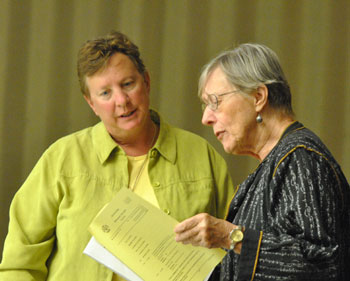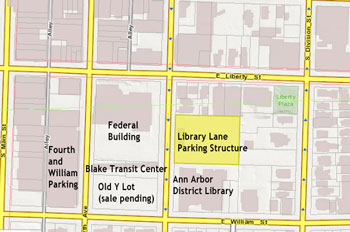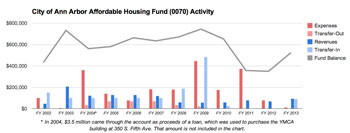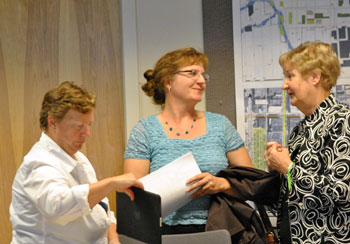Ann Arbor city council meeting (Sept. 17, 2012): The council’s initial agenda, released on Wednesday before the Monday meeting, was relatively light. But by the time the council had approved that agenda to start the meeting, it had grown considerably heavier.

Left to right: Sandi Smith (Ward 1) and former councilmember and planning commissioner Jean Carlberg. (Photos by the writer.)
Five significant items had been added: (1) a proposal to suspend temporarily the footing drain disconnection program in one area of the city; (2) a proposal to waive temporarily the city’s living wage requirement for certain nonprofits; (3) a proposal to establish a sidewalk gap elimination program; (4) a resolution on dealing with proceeds of city-owned land sales that competed with one already on the agenda; and (5) reconsideration of allocating $60,000 for a transit study – funding that the council had rejected at its previous meeting.
The first two items were added on Friday, Sept. 14. The second two were added the day of the meeting (Sept. 17), with the fifth item added at the council table. Of the added items, the council approved only one – to suspend temporarily the footing drain disconnect program. The rest were postponed, withdrawn or voted down.
Postponed was the resolution added by Mike Anglin (Ward 5) to establish a committee of city officials and 10 residents – two from each ward, to be selected by councilmembers for respective wards – to address the issue of city-owned parcels in downtown Ann Arbor. The citizen committee to be established by Anglin’s resolution would study the available options for use of proceeds from the sale of downtown city properties.
Also postponed was the resolution that Anglin’s proposal was essentially challenging, which was brought forward by Sandi Smith (Ward 1). Smith wants to direct the proceeds from city-owned land sales to the city’s affordable housing trust fund. Her idea – which she first floated to her council colleagues in an email written in late August – enjoyed the support of nonprofits, as well as the Ann Arbor Downtown Development Authority board and the Washtenaw County board of commissioners.
While Anglin’s resolution was postponed until Oct. 1, Smith’s was referred to the council’s budget committee and postponed until the council’s Oct. 15 meeting.
Also postponed was a requested $60,000 contribution to fund further study of a transportation connector – for the corridor running from US-23 and Plymouth southward along Plymouth to State Street and farther south to I-94. The outcome of this phase is to identify a preferred choice of technology (e.g., bus rapid transit, light rail, etc.) and the location of stations and stops. The council had voted down the proposal at its Sept. 4 meeting, but it was brought back for reconsideration on Sept. 17, only to be postponed until Oct. 15. The $60,000 is meant to be the city’s share of a $300,000 local match for a $1.2 million federal grant that has already been awarded.
Withdrawn was the proposal to waive a requirement of the city’s living wage ordinance for those nonprofits that receive funding from the city to deliver human services. The ordinance has a provision for a hardship waiver, but states that a nonprofit must submit a plan for eventual compliance within three years. No nonprofits had submitted such plans, meaning that the council’s resolution would have amounted to an attempt by the council to amend the living wage ordinance through a simple resolution, which it cannot do. When the council reached the item on the agenda, it was withdrawn, with an indication that an ordinance revision would be brought forward to a future meeting.
Also at the Sept. 17 meeting, the council heard about an item related to nonprofit funding for human services that will be brought forward on Oct. 1: a request to continue the two-year pilot program for coordinated funding. That news came during a presentation from Mary Jo Callan, head of the city/county office of community and economic development.
Voted down was a plan to initiate a 5-year program to eliminate sidewalk gaps in the city. Councilmembers voting against the resolution pointed to the fact that the city’s non-motorized transportation plan takes a comprehensive approach to identifying such gaps. They feared that people might mistakenly believe that certain gaps would necessarily be filled through this program, and raised concerns about equity. The resolution sought to identify independent funding sources to pay for such projects – the city’s strategy in the past has been to levy special assessments on owners of property adjoining the sidewalks.
The footing drain disconnect program was the only one of the late additions to the agenda on which the council took final action. In the general vicinity of the Lansdowne neighborhood, where some houses have already had sump pumps installed as part of the disconnect program, residents have reported that during heavy rains, the overland stormwater flows and the sheer volume of water in the city’s stormwater system prevent sump pumps from being effective. At an Aug. 22 neighborhood meeting, residents had called for a moratorium on the program. That’s essentially what the council’s resolution did.
Flooding was also a topic included in other council business that had been placed on the agenda through the regular agenda-setting process. The council approved an update to the city’s hazard mitigation plan. It will allow the city to receive already-approved federal funds for demolishing two out-buildings located in the floodway at the city-owned 721 N. Main property.
Also related to emergency preparedness, the city council authorized the purchase of a light rescue vehicle that can be used by firefighters to respond to medical calls. Because its staffing requirement is just two firefighters instead of three, the use of the vehicle would allow response to medical calls without diminishing as much of the department’s response capability for fire calls.
The council also gave final approval to rezoning of an Eden Court property to public land. [Full Story]







